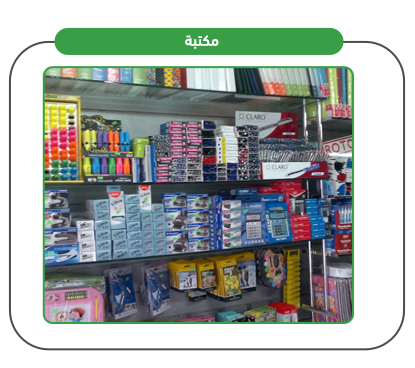Opening a school supplies library is a vital business venture that aims to meet the needs of students and professionals of all ages. The project focuses on providing a variety of school supplies and office supplies, including papers, notebooks, pens, bags, and books. These products are essential for school, institute, and university students, ensuring sustainable demand for library services. The project’s services are not limited to selling stationery alone; it also offers additional services such as printing, photocopying, binding, packaging, and more. The project is easy to manage compared to other businesses and requires relatively low capital, making it an ideal choice for those looking to start a stable and profitable business. The project may enhance its value by selling educational toys that encourage fun learning, making it a favorite destination for students and parents alike. Thanks to this diversity of products and services, the project is a promising investment opportunity that strikes a balance between sustainability and profitability.

The school supplies store project is an innovative option that meets the needs of students and professionals from various backgrounds, providing school and office supplies at high quality and competitive prices. The project allows customers to obtain everything they need in one place, from necessary tools to the other services we mentioned (printing, photocopying, binding, and packaging). Keeping pace with the digital evolution, the project enables its customers to shop online. They can easily browse and order products through a dedicated online platform, saving time and effort and ensuring a convenient and fast shopping experience. The project will be located in a central, accessible location, attracting a wide range of target audiences.



Diverse products and services.
Online shopping.
Central, easily accessible location.
Competitive prices.
Executive summary
Study project services/products
Market Size Analysis
Risk Assessment
Technical study
Financial study
Organizational and administrative study

Service sector in GCC countries
According to the macroeconomic theory of sectors, the economy is divided into three main and large sectors: the first; – is the sector that is based on collecting raw materials and includes mining companies, timber companies, oil exploration companies, in addition to agricultural and fishing industries. The second sector; is the sector that depends on goods and their sale, such as: (car manufacturing, furniture, clothing trade… etc.). As for the third sector, known as the “services” sector; it is the sector responsible for providing and producing services, essentially relying on intangible things, such as: entertainment, health care, transportation, hospitality, restaurants, etc. This theory believes that the more advanced countries are, the more their economies are based on the third sector, unlike primitive countries, which rely mostly on the first sector (the United States of America, for example, the service sector constitutes 85% of its economy).
Kingdom of Saudi Arabia:
The State of Qatar:
Kuwait:
United Arab Emirates:
Sultanate of Oman:
Global Service Sector
The service sector is the major contributor to the world’s gross product; It alone accounts for more than three fifths of this output. The sector does not rely on the production of tangible goods such as automobile and furniture, but rather on the provision of intangible services such as banking, medical care, transportation, hospitality, leisure, etc. The value of the sector market was estimated in 2020 at USD 10,814.49 billion and rose to USD 11,780.11 billion in 2021. The market achieved a CAGR of 8.9%. After recovering from the effects of the coronavirus pandemic, global market experts expect the sector’s market to reach US $ 15683.84 billion by 2025, bringing the market to a CAGR of 7% in the coming years.
